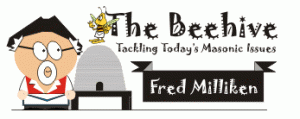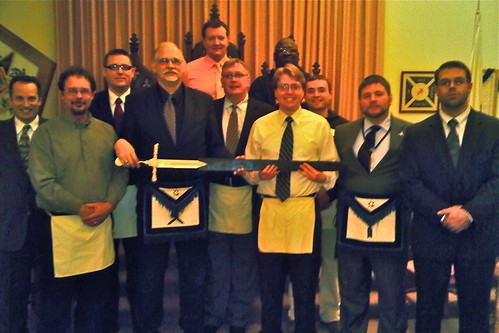TFS #209
Posted by: "Ed Halpaus"
hiram223
Wed Nov 30, 2011 9:12 pm (PST)
*T.F.S.*
*Three, five, and seven*
*3 * *5 * *7*
By Stan Shapiro MD, Grand Lodge Education Officer G.L. of MN
#209
*“Clear thinking requires courage rather than
intelligence.<
http://thinkexist.com/quotation/clear_thinking_requires_courage_rather_than/225932.html>
” Thomas S. Szasz <
http://thinkexist.com/quotes/thomas_s._szasz/>*
*The following well written and thought provoking article was sent Hans
Wang, Worshipful Master of Plymouth Lodge #160, is a new member of the
Minnesota Grand Lodge Writers* *Guild. *
* *
*Masonry as a Political Act*
* *
When Ole O. Moen retired from his position as Professor of North American
Studies at the University of Oslo this year, after teaching Norwegian
students about the United States for 32 years, he was asked what he thought
of current trends in America in general. His answer was simply that “for
the first time in history, [we have] a generation of Americans [that] are
dumber than their parents.”
Moen is hardly the first person to hold that opinion. In his 1985 book
“Amusing Ourselves to Death: Public Discourse in the Age of Show Business”,
Neil Postman discusses the fact that Americans who were around during the
Lincoln-Douglas debates were fairly sophisticated in terms of their ability
to understand subtle nuances of argument. Postman points out that the two
“consistently drew upon more complex rhetorical resources – sarcasm, irony,
paradox, elaborated metaphors, fine distinctions and the exposure of
contradiction.”
Neil Postman spends most of his book discussing how we have become lulled
into a state of apathy by the televised news media, that our future is
Huxleyan rather than Orwellian because, with a placated populace, there is
no need for a Big Brother Government. In later interviews, Postman spoke of
an endless sea of information where individuals become “preoccupied with
some equivalent of the feelies, the orgy porgy, and the centrifugal
bumblepuppy.” Postman was worried that television brought with it
“misleading information – misplaced, irrelevant, fragmented or superficial
information – information that creates the illusion of knowing something,
but which in fact leads one away from knowing.”
*As Freemasons, we have a continuous duty to educate ourselves*. That duty
is emphasized, in particular, during the second degree. Yet education is
not simply knowledge; it also includes knowing how to evaluate the
credibility of various positions and the soundness of the arguments made.
Some have argued that Thomas Young (1773-1829) was the last man to know
everything. When invited to contribute to the Encyclopedia Britannica,
Young offered to assist with the following subjects: “Alphabet, Annuities,
Attraction, Capillary Action, Cohesion, Color, Dew, Egypt, Eye, Focus,
Friction, Halo, Hieroglyphic, Hydraulics, Motion, Resistance, Ship, Sound,
Strength, Tides, Waves, and anything of a medical nature.” In terms of our
duty to educate ourselves, Young is an example of what we as Masons should
aspire to.
The growth of the internet in the years since Postman’s death in 2003 has
brought with it yet another layer of complexity; the idea that every
argument, no matter how illogical, untested or contradictory, somehow has
merit. The problem is that not every argument has merit. During the middle
chamber lecture, Fellowcrafts are informed that “[l]ogic teaches us to
guide our reason discretionally in the general knowledge of things . . .
and in it are employed the faculties of conceiving, judging, reasoning, and
disposing [until] the point in question is finally determined.” If there is
one thing that the internet is particularly good at, it is continuing and
evolving arguments that have no merit yet persistently refuse to die:
zombie arguments.
In a recent issue of the NY Times Sunday Magazine, Stephen Marche reviewed
the film “Anonymous” – a movie that argues, in true Da Vinci Code fashion,
that Shakespeare did not write Shakespeare. Marche observes that “[t]he
Shakespeare controversy” is “one of the origins of the willful ignorance
and insidious false balance that is now rotting away our capacity to have
meaningful discussions. The wider public . . . assumes that if there are
arguments, there must be reasons for those arguments. Along with a
right-wing anti-elitism, an unthinking left-wing open-mindedness and
relativism have also given lunatic ideas soil to grow in. Our politeness
has actually led us to believe that everybody deserves a say.”
*Our duty to educate ourselves is broad, and clearly extends to the
political sphere. Politics with a small “p” has no place in a Masonic Lodge
– and rightfully so, but the act of being a Freemason is itself a Political
Act.* We rarely reflect on this because we live in a society where
Government does not overtly oppress us, but we do not need to look that far
out across our borders or into the history books to find those who believe
that the Masons pose a significant threat. Candidates for Freemasonry, in
our own State, used to be asked whether they espoused Communist leanings as
part of the interview process.
Tolerance, truth, justice and equality are terms frequently used during our
degree work, but how many of us stop to reflect on whether our own
political views actually embody those tenets? How many of us reiterate
arguments we have heard on television without knowing whether there are
facts to back those arguments up? The current economic downturn has ushered
in a sense of powerlessness that Americans have not felt for a long time
and there is enough blame to go around. People on the right blame
politicians, people on the left blame corporations, each only focused on
half of the problem. I am surprised that Freemasons have not been blamed
yet.
In the interview with the Norwegian newspaper Finansavisen, that the above
quote is taken from, Ole O. Moen discusses the fact that today’s students
do not bother to memorize anything since it is easy to look up the answer
to just about any question online: “[a]ctual knowledge has become a hurdle
to novel thinking. Instead everyone wants to reinvent the wheel.” Novel
thinking, in Moen’s view, requires knowing what others have done beforehand.
To navigate the sea of information Postman warned us about requires
education and intellectual sophistication. In the end, it does not matter
if you lean to the left or right politically. What does matter is that the
same healthy anti-authoritarian distrust displayed the degrees of Scottish
Rite Masonry also is applied to politics in general – that we as Masons
question those who deal in absolutes the same way we question authority in
general. Sometimes authority comes in the form of a leader who “flings his
corsair into the scales” to quote from the ninth degree, other times it
comes in the form of oceans of disinformation intended to pacify and
placate. Regardless of how authority manifests itself, our duty to educate
ourselves about it endures: a Political Act.
Hans Wang, Worshipful Master – Plymouth Lodge #160 2011
*Words to Live By: “Thinking is the hardest and most exhausting of all
labor; and hence many people shrink from it.” Wallace D. Wattles
<
http://philosophersnotes.com/quotes/by_teacher/Wallace%20D.%20Wattles>*
* *
* *
If you have any comments, suggestions, or questions, please send them to
shapiro.stanley@gmail.com
The Education Videos by our education committee can be viewed at:
http://www.youtube.com/glmned
The latest Masonic Monday Question, and some of the past questions, can be
viewed at
www.Lodgebuilder.org and at
www.mn-masons.org
Ed Halpaus 32° K.C.C.H., FPS
Grand Lodge Officer
Grand Lodge A.F. & A.M. of MN
Executive Secretary - The Philalethes Society
763-552-0466 - Home
763-516-4435 - Cell
Skype i.d.- edhalpaus
http://halpaus.blogspot.com/
http://www.recipecircus.com/recipes/Leo/
http://sites.google.com/site/edsmasonicmatters/
http://www.facebook.com/ed.halpaus
<
http://www.facebook.com/ed.halpaus>
"No wise person ever wanted to be younger."
Native American Aphorism










